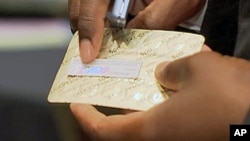Last month, representatives from all over the world discussed the dangers posed by counterfeit medicines at the World Health Assembly in Geneva. The problem is growing. The World Health Organization (WHO) warns that more than half of all medicines bought online are counterfeit. U.S. experts say there is no one solution.
Last year, 84 infants died in Nigeria from tainted teething syrup. More than 2,000 times last year, counterfeit medicines caused illness and death, according to the Pharmaceutical Security Institute, a watchdog group. That's an increase of more than nine percent over 2008.
Scott LaGanga, director of PhRMA, a leading pharmaceutical research and manufacturing company, says it's easy and profitable to sell look-alike, low quality drugs. "We are not all experts. And so we trust the supply chain to deliver the right product," he said. "In a lot of the parts of the developing world this trust could be broken and because it's become so profitable to distribute, sell, manufacture, a lot of these products that are of low quality, and substandard."
The production and sale of counterfeit drugs are a problem for both rich and poor countries.
WHO says in rich countries, counterfeit drugs typically involve hormones, steroids, and anti-cancer medications.
But in developing countries, especially Africa, patients buy medicines -- often counterfeit -- to treat life threatening diseases like malaria, tuberculosis, and HIV/AIDS. And those diseases could worsen quickly with substandard or bogus medications.
Ashifi Gogo heads a company that protects consumers against counterfeiters. He says Nigeria's government is fighting back with mobile phone technology that the company developed. "We have developed a technology which makes it easy for consumers to authenticate medication at the point of purchase. There is a scratch panel - just like a lottery ticket with number on the drug - each drug has a different number. When you buy a drug, you scratch the panel, you send a text message with the number that you see, and you get a response instantly at the counter if the drug is genuine or fake," he explained.
WHO reports that although counterfeit drugs are sold globally, rich countries are better at policing and preventing sales.
LaGanga says combating these drugs is all the more difficult because some countries lack tough laws. "If one country makes an immense step forward, even like the U.S. has done over the years with a very strong regulatory agency like FDA, with very good law enforcement in place, with good coordination around the world, it's not sufficient for the rest of the world. It's also not sufficient for those people who are into new mediums like online pharmacy sphere," he stated.
Major manufacturers of generic medications, in India and Brazil, accuse the pharmaceutical industry of using the issue of counterfeiting to protect their patents.
But WHO says its issue is not intellectual property rights, but public health.









